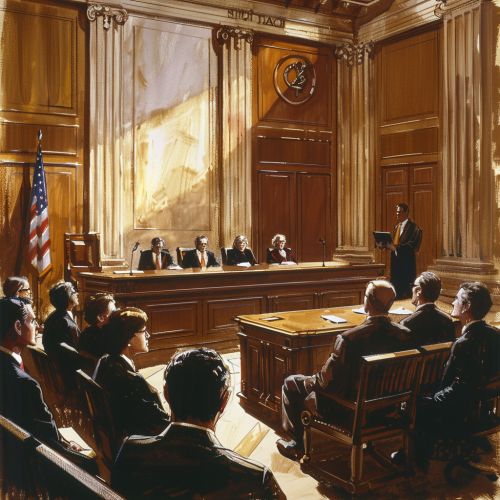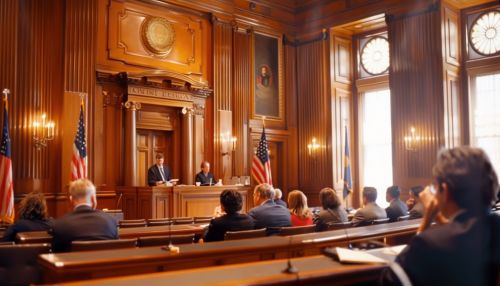Lemon v. Kurtzman: Difference between revisions
(Created page with "== Background == The case of '''Lemon v. Kurtzman''' (403 U.S. 602) was a landmark decision by the United States Supreme Court that established the "Lemon Test" for determining whether a law violates the Establishment Clause of the First Amendment. The case was decided on June 28, 1971, and it involved controversies over state laws that provided financial support to religiou...") |
No edit summary |
||
| Line 52: | Line 52: | ||
== References == | == References == | ||
[[Image:Detail-91979.jpg|thumb|center|A courtroom scene with justices seated at the bench and attorneys presenting arguments.|class=only_on_mobile]] | |||
[[Image:Detail-91980.jpg|thumb|center|A courtroom scene with justices seated at the bench and attorneys presenting arguments.|class=only_on_desktop]] | |||
[[Category:United States Supreme Court cases]] | [[Category:United States Supreme Court cases]] | ||
[[Category:First Amendment case law]] | [[Category:First Amendment case law]] | ||
[[Category:1971 in United States case law]] | [[Category:1971 in United States case law]] | ||
Latest revision as of 18:41, 18 June 2024
Background
The case of Lemon v. Kurtzman (403 U.S. 602) was a landmark decision by the United States Supreme Court that established the "Lemon Test" for determining whether a law violates the Establishment Clause of the First Amendment. The case was decided on June 28, 1971, and it involved controversies over state laws that provided financial support to religious schools.
Facts of the Case
The case originated from statutes in Pennsylvania and Rhode Island that provided state aid to church-related elementary and secondary schools. The Pennsylvania statute, known as the Nonpublic Elementary and Secondary Education Act, allowed the state to reimburse nonpublic schools for teachers' salaries, textbooks, and instructional materials, provided they were used in secular subjects. Similarly, the Rhode Island Salary Supplement Act provided a 15% salary supplement to teachers in nonpublic schools.
Alton Lemon, a Pennsylvania instructor and parent, filed a lawsuit against David Kurtzman, the Superintendent of Public Instruction in Pennsylvania, claiming that the statute violated the Establishment Clause. The case was consolidated with a similar case from Rhode Island, and the Supreme Court agreed to hear the combined cases.
Legal Issues
The primary legal issue in Lemon v. Kurtzman was whether the state statutes that provided financial aid to religious schools violated the Establishment Clause of the First Amendment. The Establishment Clause prohibits the government from making any law "respecting an establishment of religion," which has been interpreted to mean that the government cannot promote or affiliate itself with any religious doctrine or organization.
The Lemon Test
In its decision, the Supreme Court established a three-pronged test, known as the "Lemon Test," to determine whether a law violates the Establishment Clause. The test consists of the following criteria:
1. **Purpose Prong**: The statute must have a secular legislative purpose. 2. **Effect Prong**: The principal or primary effect of the statute must neither advance nor inhibit religion. 3. **Entanglement Prong**: The statute must not result in an "excessive government entanglement" with religion.
The Court found that both the Pennsylvania and Rhode Island statutes failed the Lemon Test. While the statutes had a secular purpose of improving education, they created an excessive entanglement between the state and religious institutions. The continuous state monitoring required to ensure that the funds were used only for secular purposes would lead to an unconstitutional entanglement.
Majority Opinion
Chief Justice Warren E. Burger delivered the opinion of the Court, which was joined by Justices Hugo Black, William O. Douglas, John Marshall Harlan II, William J. Brennan Jr., Potter Stewart, Byron White, and Thurgood Marshall. The Court held that the statutes in question violated the Establishment Clause because they fostered an excessive entanglement between government and religion.
Concurring Opinions
Justice William O. Douglas wrote a concurring opinion, emphasizing the importance of maintaining a strict separation between church and state. He argued that any form of state aid to religious institutions inherently risks entangling the government in religious affairs.
Justice Byron White also wrote a concurring opinion, agreeing with the majority's application of the Lemon Test but expressing concern about the potential for the test to be applied too rigidly in future cases.
Dissenting Opinions
Justice William Rehnquist was the sole dissenter in the case. He argued that the majority's interpretation of the Establishment Clause was too restrictive and that the statutes in question did not constitute an unconstitutional entanglement between government and religion.
Impact and Subsequent Developments
The Lemon Test established in Lemon v. Kurtzman has been a critical tool in subsequent Establishment Clause cases. It has been used to evaluate a wide range of issues, from school prayer to government funding of religious organizations. However, the test has also faced criticism and calls for revision or abandonment. Some justices and legal scholars argue that the test is too rigid and does not adequately account for the complexities of modern church-state interactions.
In later cases, such as Agostini v. Felton (1997) and Zelman v. Simmons-Harris (2002), the Supreme Court has modified and, in some instances, moved away from the strict application of the Lemon Test. These cases reflect an ongoing debate within the Court about the proper interpretation of the Establishment Clause and the role of government in relation to religion.
See Also
- Establishment Clause
- First Amendment to the United States Constitution
- Agostini v. Felton
- Zelman v. Simmons-Harris
References


